Stocks Shrugging off Bad News Attempt a Rebound
Stock-Markets / Stock Markets 2010 Jun 12, 2010 - 03:25 PM GMT Retail Sales in U.S. Fall as Consumers Boost Savings - Sales at U.S. retailers unexpectedly dropped in May, signaling consumers boosted savings as employment slowed and stocks fell. Purchases decreased 1.2 percent, the biggest drop since September 2009, following a 0.6 percent April gain that was larger than previously estimated, Commerce Department figures showed today in Washington. Demand plunged at building-material stores, reflecting the end of a government appliance rebate, and sales fell at auto dealers, in contrast to industry figures which showed a gain.
Retail Sales in U.S. Fall as Consumers Boost Savings - Sales at U.S. retailers unexpectedly dropped in May, signaling consumers boosted savings as employment slowed and stocks fell. Purchases decreased 1.2 percent, the biggest drop since September 2009, following a 0.6 percent April gain that was larger than previously estimated, Commerce Department figures showed today in Washington. Demand plunged at building-material stores, reflecting the end of a government appliance rebate, and sales fell at auto dealers, in contrast to industry figures which showed a gain.
Banks With Sovereign Debt Ignore Not-If-But-When Default.
European banking shares indicate a Greek debt default may be just a matter of time.
Investors have already pushed down financial stocks enough to imply the “erosion” in book value that may result from losses tied to a sovereign debt restructuring, said Dirk Hoffmann-Becking, an analyst at Sanford C. Bernstein in London. A Bloomberg index of European financial firms dropped as much as 22 percent since April 15 to the lowest level since July.
The Fed is cooking the books again.
The "household sector" plug in the Fed's Flow of Funds reports provides some very crude and often inaccurate fund flow data when it comes to the US consumers, but at least one can often get a sense of which way capital is flowing. A casual glance at the change in the non-seasonally adjusted household financial assets reveals something strange: even as every tracker of mutual fund flows has repeatedly indicated that US investors are not only not investing in stocks, but are now increasingly redeeming funds from domestic corporate equities, the Fed will have you believe quite the opposite.
Stocks attempt a rebound.
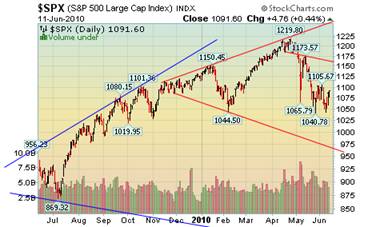 --Stocks are attempting to shrug off more bad news this week. The mainstream media wants us to believe that a recovery is in the pipeline. A few analysts have begun to see the significance of the Flash Crash in early May. What may be ahead of us may be a repeat performance, since so many have shrugged off the significance and the danger of another high-speed computer sell-off. Ignoring the problem will not make it go away.
--Stocks are attempting to shrug off more bad news this week. The mainstream media wants us to believe that a recovery is in the pipeline. A few analysts have begun to see the significance of the Flash Crash in early May. What may be ahead of us may be a repeat performance, since so many have shrugged off the significance and the danger of another high-speed computer sell-off. Ignoring the problem will not make it go away.
Treasury bonds are giving an early indication of trouble ahead.
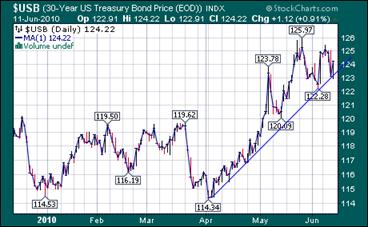 - Treasury bonds are also showing an increase of volatility that does not bode well for the long-term health of the rally. Widening CDS spreads on U.S. Treasury debt suggest a growing awareness of our inability to service our debt. Fortunately, bonds rallied off their trendline today. But the message being given on the chart is that the bond rally may not last much longer.
- Treasury bonds are also showing an increase of volatility that does not bode well for the long-term health of the rally. Widening CDS spreads on U.S. Treasury debt suggest a growing awareness of our inability to service our debt. Fortunately, bonds rallied off their trendline today. But the message being given on the chart is that the bond rally may not last much longer.
Gold may be completing a Broadening Top Formation.
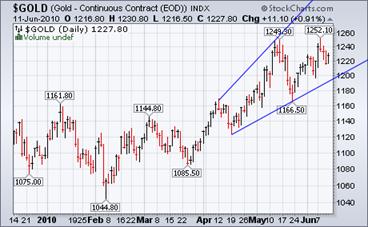 -- Gold has fulfilled its minimum requirement for completing its Broadening Wedge Formation. Although there may be room for a higher rally, the Broadening Formation is complete once the third top exceeds the second. A Broadening Wedge is considered by many of the best analysts to be a topping pattern. Fears of deflation may cut the rally short, so please be alert. The next and final warning is a breach of the lower trendline
-- Gold has fulfilled its minimum requirement for completing its Broadening Wedge Formation. Although there may be room for a higher rally, the Broadening Formation is complete once the third top exceeds the second. A Broadening Wedge is considered by many of the best analysts to be a topping pattern. Fears of deflation may cut the rally short, so please be alert. The next and final warning is a breach of the lower trendline
Nikkei is now “at risk of collapse.”
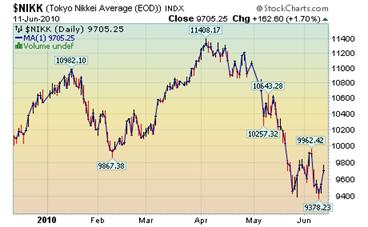 -- Japan is at "risk of collapse" under its huge debt mountain, the country's new prime minister has said.
Naoto Kan, in his first major speech since taking over, said Japan needed a financial restructuring to avert a Greece-style crisis.
-- Japan is at "risk of collapse" under its huge debt mountain, the country's new prime minister has said.
Naoto Kan, in his first major speech since taking over, said Japan needed a financial restructuring to avert a Greece-style crisis.
“Our country's outstanding public debt is huge... our public finances have become the worst of any developed country," he said.
China stocks may be ready for a reversal – to the upside?
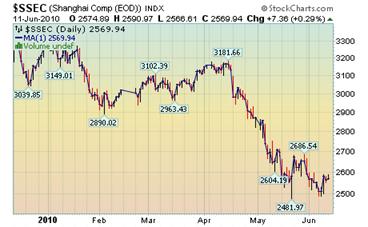 -- The Shanghai Index managed to stay above prior lows as it attempts to build a base after a steep one-month decline. The largest of China’s stock exchanges, managed to stay above its May lows, an important technical accomplishment. China has implemented austerity measures and raised bank reserves to fight against the bubble of debt that its markets have created. It may be possible that they have correctly curbed excessive risk taking in their markets.
-- The Shanghai Index managed to stay above prior lows as it attempts to build a base after a steep one-month decline. The largest of China’s stock exchanges, managed to stay above its May lows, an important technical accomplishment. China has implemented austerity measures and raised bank reserves to fight against the bubble of debt that its markets have created. It may be possible that they have correctly curbed excessive risk taking in their markets.
The dollar is still considered a safe haven.
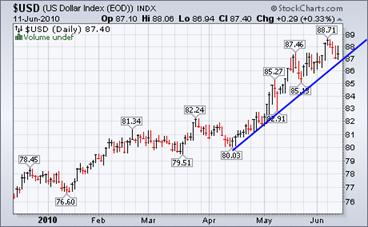 -- The dollar rose against the euro for the first time in four days as an unexpected drop in U.S. retail sales increased concern the global economic recovery may not be sustainable, boosting the currency’s appeal as a haven.
-- The dollar rose against the euro for the first time in four days as an unexpected drop in U.S. retail sales increased concern the global economic recovery may not be sustainable, boosting the currency’s appeal as a haven.
The greenback gained against most major currencies even as other data showed U.S. consumer confidence rose to its highest level since 2008.
The Housing Index is already in crash mode.
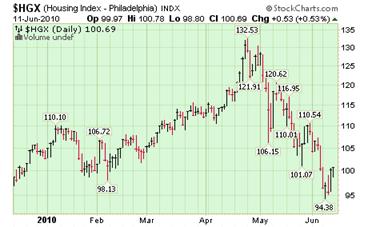 --U.S. home foreclosures reached a record for the second consecutive month in May, with increases in every state, as lenders stepped up property seizures, according to RealtyTrac Inc. Bank repossessions climbed 44 percent from May 2009 to 93,777, the Irvine, California-based data company said today in a statement. Foreclosure filings, including default and auction notices, rose about 1 percent to 322,920. One out of every 400 U.S. households received a filing.
--U.S. home foreclosures reached a record for the second consecutive month in May, with increases in every state, as lenders stepped up property seizures, according to RealtyTrac Inc. Bank repossessions climbed 44 percent from May 2009 to 93,777, the Irvine, California-based data company said today in a statement. Foreclosure filings, including default and auction notices, rose about 1 percent to 322,920. One out of every 400 U.S. households received a filing.
Gasoline availability may be impacted by the hurricane season.
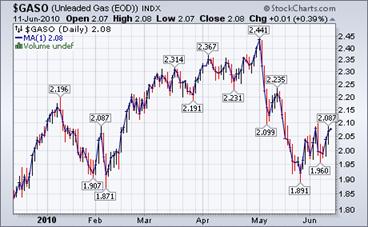 --The Energy Information Agency weekly report observes, “It is difficult to forecast the impact of severe tropical weather in the Gulf of Mexico region on crude oil production, because shut-in production in any particular year varies depending on the overall level of severe weather and the specific track of each storm (see Figure 1). The 2008 and 2009 hurricane seasons illustrate a wide range of oil production impacts. In September of 2008, disruptions caused by Hurricanes Gustav and Ike led to cumulative seasonal production outages of 65 million barrels of crude oil. In contrast, during the 2009 season, only one Category 2 hurricane threatened the producing areas, causing a seasonal outage of only about 3 million barrels.”
--The Energy Information Agency weekly report observes, “It is difficult to forecast the impact of severe tropical weather in the Gulf of Mexico region on crude oil production, because shut-in production in any particular year varies depending on the overall level of severe weather and the specific track of each storm (see Figure 1). The 2008 and 2009 hurricane seasons illustrate a wide range of oil production impacts. In September of 2008, disruptions caused by Hurricanes Gustav and Ike led to cumulative seasonal production outages of 65 million barrels of crude oil. In contrast, during the 2009 season, only one Category 2 hurricane threatened the producing areas, causing a seasonal outage of only about 3 million barrels.”
Natural Gas prices seeing a spike in prices.
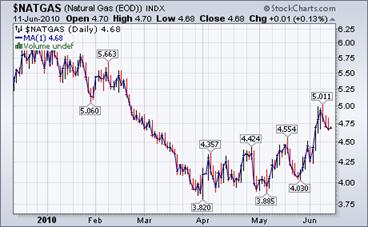 -- The U.S. Energy Information Administration reports, “Natural gas prices rose across the board, continuing increases from the previous week. Most prices spiked in trading on Tuesday, before dropping off slightly on the last day of the report week. For example, the Henry Hub natural gas spot price peaked at $4.89 per MMBtu on Tuesday before ending trading yesterday at $4.75 per MMBtu.”
-- The U.S. Energy Information Administration reports, “Natural gas prices rose across the board, continuing increases from the previous week. Most prices spiked in trading on Tuesday, before dropping off slightly on the last day of the report week. For example, the Henry Hub natural gas spot price peaked at $4.89 per MMBtu on Tuesday before ending trading yesterday at $4.75 per MMBtu.”
$34 billion asset manager calls a spade..a spade!
The following presentation by $34 billion Southeastern Asset Management (SAM), titled "Comment & Analysis on Equity Market Structure" which must be brought to the attention of all those who have the temerity to defend High Frequency Traders as an altruistic source of liquidity. SAM's four points are simple, and laid out in an easy to understand presentation. Read the analysis by Zero Hedge.
- The US equity markets are meant to facilitate investors' allocation of capital to businesses, thus expanding production and improving the quality of life in America.
- The markets have strayed from this social purpose, and presently resemble casinos more than orderly markets. As a result, the economy is hindered, fewer jobs are created, and reasonable returns for true investors (not traders) are compromised.
- The property rights of creators of intellectual capital are being systematically and openly ignored by the exchanges and certain market participants. The order originator's hard work, ingenuity, and prospective returns are being taken and sold by those who did not create it.
- Whereas trading was once a means with which to match long-term buyers and sellers of businesses, trading has now become an end in and of itself.
Traders alert: The Practical Investor is currently offering the daily Inner Circle Newsletter to new subscribers. Contact us at tpi@thepracticalinvestor.com for a free sample newsletter and subscription information.
Our Investment Advisor Registration is on the Web
We are in the process of updating our website at www.thepracticalinvestor.com to have more information on our services. Log on and click on Advisor Registration to get more details.
If you are a client or wish to become one, please make an appointment to discuss our investment strategies by calling Connie or Tony at (517) 699-1554, ext 10 or 11. Or e-mail us at tpi@thepracticalinvestor.com .
Anthony M. Cherniawski, President and CIO http://www.thepracticalinvestor.com
As a State Registered Investment Advisor, The Practical Investor (TPI) manages private client investment portfolios using a proprietary investment strategy created by Chief Investment Officer Tony Cherniawski. Throughout 2000-01, when many investors felt the pain of double digit market losses, TPI successfully navigated the choppy investment waters, creating a profit for our private investment clients. With a focus on preserving assets and capitalizing on opportunities, TPI clients benefited greatly from the TPI strategies, allowing them to stay on track with their life goals
Disclaimer: The content in this article is written for educational and informational purposes only. There is no offer or recommendation to buy or sell any security and no information contained here should be interpreted or construed as investment advice. Do you own due diligence as the information in this article is the opinion of Anthony M. Cherniawski and subject to change without notice.
Anthony M. Cherniawski Archive |
© 2005-2022 http://www.MarketOracle.co.uk - The Market Oracle is a FREE Daily Financial Markets Analysis & Forecasting online publication.



